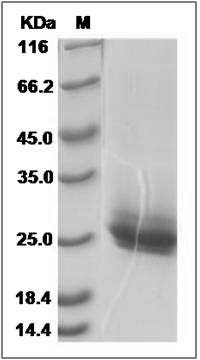-
Product Name
Human Frizzled-10/FZD10 (CD350) (His Tag) recombinant protein
- Documents
-
Description
Mouse Frizzled-10, also known as Fz-10, CD350 and FZD10, is a multi-pass membrane protein which belongs to the G-protein coupled receptor Fz/Smo family. Frizzled-10 / FZD10 is abundantly expressed in the cerebellum, followed by cerebral cortex, medulla and spinal cord; very low levels in total brain, frontal lobe, temporal lobe and putamen. It is weakly expressed in adult brain, heart, lung, skeletal muscle, pancreas, spleen and prostate. Frizzled-10 / FZD10 is a receptor for Wnt proteins. Most of frizzled receptors are coupled to the beta-catenin canonical signaling pathway, which leads to the activation of disheveled proteins, inhibition of GSK-3 kinase, nuclear accumulation of beta-catenin and activation of Wnt target genes. A second signaling pathway involving PKC and calcium fluxes has been seen for some family members, it is not yet clear if it represents a distinct pathway or if it can be integrated in the canonical pathway, as PKC seems to be required for Wnt-mediated inactivation of GSK-3 kinase. Both pathways seem to involve interactions with G-proteins. Frizzled-10 / FZD10 may also be involved in transduction and intercellular transmission of polarity information during tissue morphogenesis and/or in differentiated tissues.
-
Protein name
Frizzled homolog 10 (Drosophila)
-
Uniprot ID
Q9ULW2
-
Gene Name
FZD10
-
Source/Expression Host
Human Cells
-
Expression Plasmid/cDNA
A DNA sequence encoding the human FZD10 (NP_009128.1) (Met1-Gly161) was expressed with a polyhistidine tag at the C-terminus.
-
Protein Species
Human
-
Molecular weight
The recombinant human FZD10 consists of 152 amino acids and predicts a molecular mass of 17.5 KDa. It migrates as an approximately 25.4 KDa band in SDS-PAGE under reducing conditions.
-
Purity
> 95 % as determined by SDS-PAGE
-
Validations

Human Frizzled-10 / FZD10 Protein (His Tag) SDS-PAGE
Related Products / Services
Please note: All products are "FOR RESEARCH USE ONLY AND ARE NOT INTENDED FOR DIAGNOSTIC OR THERAPEUTIC USE"
